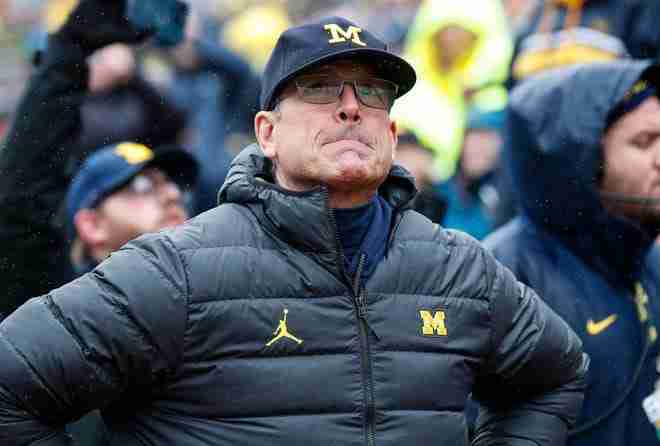There will likely be some complaints coming from Michigan this week thanks to the College Football Playoff selection committee, who ranked the Wolverines No. 3 despite being the most dominant team in the sport week in and week out this season.
They should probably thank the committee for studying them.
If Tuesday’s rankings tell us anything, it’s the sign-stealing scandal in Michigan – for better or for worse – will not be part of the CFP committee’s calculations.
“Our job right now is to sort the teams to follow our protocols,” NC State athletic director Boo Corrigan, who chairs the committee, said on ESPN. “And as we went along, it really wasn’t part of any of the discussions that took place during our time together. This is an NCAA problem, it is not a CFP problem.
Fair enough. The CFP’s job is to determine the four best teams in the country, not to debate every detail that has emerged regarding what suspended Michigan staffer Connor Stalions was doing when he apparently sent buddies to stadiums across the country to film Michigan’s future opponents in an attempt to decipher the signals.
But there’s a problem here: As this scandal unfolds in real time, doesn’t the CFP committee at least have a responsibility to try to determine whether Michigan is beating its opponents by an average of 35 points per game because he cheated in a way that gave the Wolverines a real, tangible advantage?
Over the years, the selection committee has considered all sorts of odd factors in ranking teams, because their job is not just to look at the data, but to understand what they’re looking at and why. Several years ago, former committee chairman Jeff Long even analyzed a Stanford loss at Northwestern because the game started at 9 a.m. Pacific Time. Yes, they actually discussed the biological clock.
NOTICE:If Michigan’s alleged sign stealing is as bad as it seems, the Wolverines will pay a high price
Is this kind of granular discussion necessary to understand the four best teams in the country in a given year? Probably not. But part of what gives the committee its self-proclaimed seriousness is the idea that it looks at every detail and examines every factor that makes a team win or lose.
And we’re supposed to believe that a major cheating scandal hanging over the head of a playoff contender should just be ignored?
During a media conference call, which Corrigan led by saying the committee was “impressed with how (Michigan) dominated its opponents,” I asked what seems like a pretty obvious question during all of this . How can a committee correctly determine that Michigan would be the third best team in the country if it didn’t even discuss whether part of its dominance was based on information it gained by breaking the rules?

At that point, CFP Executive Director Bill Hancock stepped in and provided what was surely a well-planned response: “Michigan has played well all season. The fact is that no one knows what happened. We are currently only dealing with allegations. The committee makes its judgments based on what happened on the field, and it’s clear that Michigan was a dominant team.
After 10 years of listening to the language of the CFP, what it says is clear. The committee is just not going to get involved in this one way or the other. And given that the NCAA is unlikely to complete a full investigation before the end of this season, that means Michigan’s only real obstacles to making the postseason are likely Penn State and Ohio State.
ANALYSIS:Winners, losers of the CFP ranking: Don’t panic. It’s the first week.
“You have to remember that these are allegations at this point and not facts,” Hancock said in response to a second question about Michigan. “So there is no substantial evidence that anything happened that could have affected the game. All the committee does is evaluate what happens on the field during matches, and that That’s why we are where we are.
But this isn’t a typical NCAA scandal like we saw in the past, when a player could be suspended because he was paid to sign autographs. As comical as the Stallions’ story is in many ways, no one who understands or works in football can deny that the alleged extent of its sign-stealing operation was designed expressly to give Michigan the advantage in information about his adversaries.
If this information was obtained by means outside of NCAA rules — and sending spies to the sidelines of filming would indeed be a blatant violation — it’s entirely fair to question whether Michigan is as good as the margins that he created.
And it just… it didn’t come up in the play at all? Hard to believe and even harder to endorse as an operating principle for a group of people expected to dig deeper than the end results.
If there’s any encouraging news in all of this, it’s that we know Michigan’s sign-stealing operation is over. Stalions is suspended and, if the allegations are proven, is unlikely to work in college football again. The Wolverines, who have yet to face anyone with a pulse, will have to face Penn State and Ohio State without help from the Stallions.
If Michigan wins these games, it will make the playoffs without asterisks or caveats. If it doesn’t, a lot of things about the Wolverines’ success over the past two years will start to look fishy in retrospect.
And after Tuesday, everything is now completely clear. No matter how embarrassing this story may be, no matter how many details surface over the coming weeks, the CFP committee will refuse to hold Michigan accountable.


